
Slide guitar is a technique for playing the guitar that is often used in blues music. It involves playing a guitar while holding a hard object against the strings, creating the opportunity for glissando effects and deep vibratos that reflect characteristics of the human singing voice. It typically involves playing the guitar in the traditional position with the use of a slide fitted on one of the guitarist's fingers. The slide may be a metal or glass tube, such as the neck of a bottle, giving rise to the term bottleneck guitar to describe this type of playing. The strings are typically plucked while the slide is moved over the strings to change the pitch. The guitar may also be placed on the player's lap and played with a hand-held bar.

Riley B. King, known professionally as B. B. King, was an American blues guitarist, singer, songwriter, and record producer. He introduced a sophisticated style of soloing based on fluid string bending, shimmering vibrato, and staccato picking that influenced many later blues electric guitar players. AllMusic recognized King as "the single most important electric guitarist of the last half of the 20th century".

Elmore James was an American blues guitarist, singer, songwriter, and bandleader. Noted for his use of loud amplification and his stirring voice, James was inducted into the Rock and Roll Hall of Fame in 1992. His slide guitar technique earned him the nickname "King of the Slide Guitar".
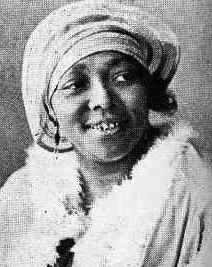
Lucille Bogan was an American classic female blues singer and songwriter, among the first to be recorded. She also recorded under the pseudonym Bessie Jackson. Music critic Ernest Borneman noted that Bogan was one of "the big three of the blues", along with Ma Rainey and Bessie Smith. Many of Bogan's songs have been recorded by later blues and jazz musicians.
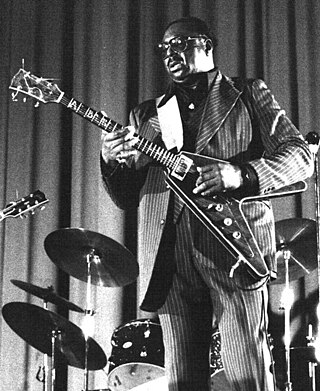
Albert Nelson, known by his stage name Albert King, was an American guitarist and singer who is often regarded as one of the greatest and most influential blues guitarists of all time. He is perhaps best known for his popular and influential album Born Under a Bad Sign (1967) and its title track. He, B. B. King, and Freddie King, all unrelated, were known as the "Three Kings of the Blues". The left-handed Albert King was known for his "deep, dramatic sound that was widely imitated by both blues and rock guitarists".

Earl Zebedee Hooker was a Chicago blues guitarist known for his slide guitar playing. Considered a "musician's musician", he performed with blues artists such as Sonny Boy Williamson II, Junior Wells, and John Lee Hooker and fronted his own bands. An early player of the electric guitar, Hooker was influenced by the modern urban styles of T-Bone Walker and Robert Nighthawk. He recorded several singles and albums as a bandleader and with other well-known artists. His "Blue Guitar", a slide guitar instrumental single, was popular in the Chicago area and was later overdubbed with vocals by Muddy Waters as "You Shook Me".
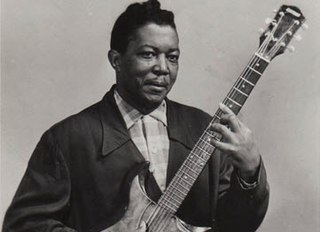
Robert Lee McCollum was an American blues musician who played and recorded under the pseudonyms Robert Lee McCoy and Robert Nighthawk. He was the father of the blues musician Sam Carr. Nighthawk was inducted into the Blues Hall of Fame in 1983.
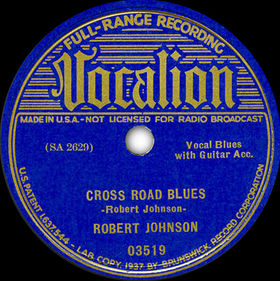
"Cross Road Blues" is a song written by the American blues artist Robert Johnson. He performed it solo with his vocal and acoustic slide guitar in the Delta blues style. The song has become part of the Robert Johnson mythology as referring to the place where he sold his soul to the Devil in exchange for musical genius. This is based largely on folklore of the American South that identifies a crossroads as the site where Faustian bargains can be made, as the lyrics do not contain any references to Satan.

"Sweet Home Chicago" is a blues standard first recorded by Robert Johnson in 1936. Although he is often credited as the songwriter, several songs have been identified as precedents. The song has become a popular anthem for the city of Chicago despite ambiguity in Johnson's original lyrics. Numerous artists have interpreted the song in a variety of styles.

"Lucille" is a 1957 rock and roll song originally recorded by American musician Little Richard. Released on Specialty Records in February 1957, the single reached number 1 on the Billboard R&B chart, 21 on the US pop chart, and number 10 on the UK chart. It was composed by Albert Collins and Little Richard. First pressings of Specialty 78rpm credit Collins as the sole writer. Little Richard bought half of the song's rights while Collins was in Louisiana State Penitentiary.

"Rollin' and Tumblin'" is a blues standard first recorded by American singer-guitarist Hambone Willie Newbern in 1929. Called a "great Delta blues classic", it has been interpreted by hundreds of Delta and Chicago blues artists, including well-known recordings by Muddy Waters. Rock musicians usually follow Waters' versions, with the 1960s group Cream's rendition being perhaps the best known.

"Call It Stormy Monday (But Tuesday Is Just as Bad)" (commonly referred to as "Stormy Monday") is a song written and recorded by American blues electric guitar pioneer T-Bone Walker. It is a slow twelve-bar blues performed in the West Coast blues-style that features Walker's smooth, plaintive vocal and distinctive guitar work. As well as becoming a record chart hit in 1948, it inspired B.B. King and others to take up the electric guitar. "Stormy Monday" became Walker's best-known and most-recorded song.

"Rock Me Baby" is a blues standard that has become one of the most recorded blues songs of all time. It originated as "Rockin' and Rollin'", a 1951 song by Lil' Son Jackson, itself inspired by earlier blues. Renditions by Muddy Waters and B.B. King made the song well-known. When B.B. King's recording of "Rock Me Baby" was released in 1964, it became his first single to reach the Top 40 in Billboard magazine's Hot 100 chart.
"Big Boss Man" is a blues song first recorded by Jimmy Reed in 1960. It became one of his most popular songs, although the songwriting is credited to Luther Dixon and Al Smith. Chicago-based Vee-Jay Records released it as a single, which became one of Reed's last appearances on the record charts. The song has been recorded by artists in diverse styles, including Elvis Presley, B.B. King, and Hope Sandoval, who also had chart successes with the song.

Sweet Black Angel is an album recorded by blues pianist Pinetop Perkins and released in 1998. The title track is a cover of Robert Nighthawk's 1949 "Black Angel Blues ". That track was based on Lucille Bogan's, "Black Angel Blues" from 1930 B. B. King later covered "Sweet Black Angel" as, "Sweet Little Angel", in 1956.

"Worried Life Blues" is a blues standard and one of the most recorded blues songs of all time. Originally recorded by Big Maceo Merriweather in 1941, "Worried Life Blues" was an early blues hit and Maceo's most recognized song. An earlier song inspired it and several artists have had record chart successes with their interpretations of the song.

"Every Day I Have the Blues" is a blues song that has been performed in a variety of styles. An early version of the song is attributed to Pinetop Sparks and his brother Milton. It was first performed in the taverns of St. Louis by the Sparks brothers and was recorded July 28, 1935 by Pinetop with Henry Townsend on guitar. The song is a twelve-bar blues that features Pinetop's piano and falsetto vocal. The opening verse includes the line "Every day, every day I have the blues".
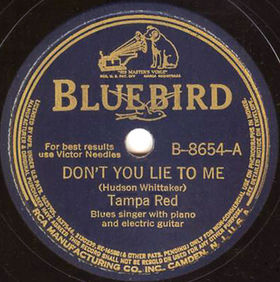
"Don't You Lie to Me" is a song recorded by Tampa Red in 1940. It became popular with blues artists, leading it to become a blues standard. The song was also interpreted by rock and roll pioneers Fats Domino and Chuck Berry.
"Sugar Mama" or "Sugar Mama Blues" is a blues standard. Called a "tautly powerful slow blues" by music journalist Charles Shaar Murray, it has been recorded by numerous artists, including early Chicago bluesmen Tampa Red, Sonny Boy Williamson I, and Tommy McClennan. John Lee Hooker and Howlin' Wolf later adapted "Sugar Mama" for electric blues and rock group Led Zeppelin reworked it during early recording sessions.
"It's Tight Like That" is a hokum or dirty blues song, recorded by Tampa Red and Georgia Tom on October 24, 1928. Vocalion Records issued it on the then standard 10-inch 78 rpm shellac record in December 1928. It became successful and eventually sold over seven million copies.

















